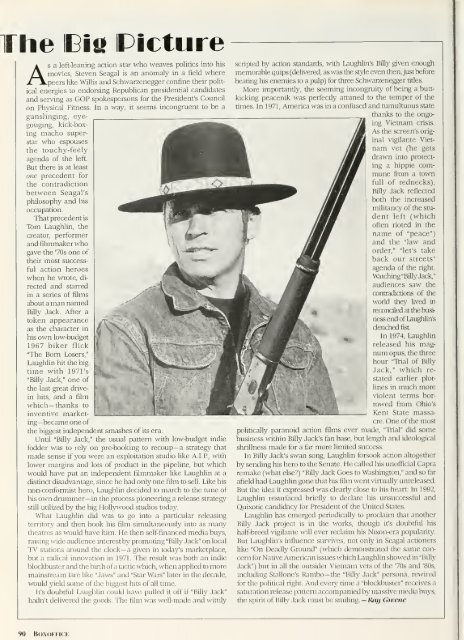You also want an ePaper? Increase the reach of your titles
YUMPU automatically turns print PDFs into web optimized ePapers that Google loves.
The lOia IPicture<br />
A'<br />
s a left-leaning action star who weaves politics into his<br />
movies, Steven Seagal is an anomaly in a field where<br />
and serving as GOP spokespersons for the President's Council<br />
on Physical Fitness. In a way, it seems incongruent to be a<br />
peers like WUlis and Schwarzenegger confine their political<br />
energies to endorsing Republican presidential candidates<br />
gunslinging, eyegouging,<br />
kick-boxing<br />
macho superstar<br />
who espouses<br />
the touchy-feely<br />
agenda of the left.<br />
But there is at least<br />
one precedent for<br />
the contradiction<br />
between Seagal's<br />
philosophy and his<br />
occupation.<br />
That precedent is<br />
Ibm Laughlin, the<br />
creator, performer<br />
and filmmaker who<br />
gave the '70s one of<br />
tlieir most successful<br />
action heroes<br />
when he wrote, directed<br />
and starred<br />
in a series of films<br />
about a man named<br />
BUly Jack. After a<br />
token appearance<br />
as the character in<br />
his oviTi low-budget<br />
1967 biker flick<br />
"The Bom Losers,"<br />
Lauglrlin hit the bit^<br />
time with 197r.N<br />
"BUly Jack," one ot<br />
the last great dri\'rin<br />
hits, and a film<br />
which— thanks Ui<br />
inventive marketing—became<br />
one ( )t<br />
die biggest independent smashes of its era.<br />
Until "BUly Jack," the usual pattern with low-budget indie<br />
fodder was to rely on pre-booking to recoup— a strategy that<br />
made sense if you were an exploitation studio like A. I. P., with<br />
lower margins and lots of product in the pipeline, but which<br />
would have put an independent Filmmaker like Laughlin at a<br />
distinct disadvantage, since he had only one film to sell. Like his<br />
non-conformist hero, Laughlin decided to march to the tune of<br />
his own drummer— in the process pioneering a release strategy<br />
still utUized by the big Hollywood studios today.<br />
What Laughlin did was to go into a particular releasing<br />
territory and then book his film simultaneously into as many<br />
theatres as would have him. He then self-financed media buys,<br />
raising wide audience interest by promoting "Billy Jack" on local<br />
TV stations around the clock— a given in today's marketplace,<br />
but a radical innovation in 1971 . The result was both an indie<br />
blockbuster and the birth ofa tactic which, when applied to more<br />
mainstream tare like "Jaws" and "Star Wars" later in the decade,<br />
would yield some of tiie biggest hits of all time.<br />
It's doubtful Laughlin could have pulled it off if "BUly Jack"<br />
hadn't delivered the goods. The film was well-made and wittily<br />
scripted by action standards, with Laughlin's BUly given enough<br />
memorable quips (delivered, as was the style even then, just before<br />
beating his enemies to a pulp) for tliree Schwarzene^er titles.<br />
More importantly, the seeming incongruity of being a buttkicking<br />
peacenik was perfectly attuned to the temper of the<br />
times. In 1 971 , America was in a conflised and tumultuous state<br />
thanks to the ongoing<br />
Viemam crisis.<br />
As the screen's original<br />
vigUante Vietnam<br />
vet (he gets<br />
drav\Ti into protecting<br />
a hippie commune<br />
from a towm<br />
full of rednecks),<br />
BUly Jack reflected<br />
both the increased<br />
mUitancy of the student<br />
left (which<br />
often rioted in the<br />
name of "peace")<br />
and the "law and<br />
order," "let's take<br />
back our streets"<br />
agenda of the right.<br />
Watching "BUly Jack,<br />
audiences saw the<br />
contradictions<br />
world<br />
of the<br />
they Uved in<br />
recondled at the business<br />
end of Laughlin's<br />
denched fist<br />
In 1974, Laughlin<br />
released his magnum<br />
opus, the three<br />
hour "Thai of Billy<br />
Jack," which restated<br />
earlier plotlines<br />
in much more<br />
violent terms borrowed<br />
from Ohio's<br />
Kent State massacre.<br />
One of the most<br />
politically paranoid action fUms ever made, "Trial" did some<br />
business within BUly Jack's fan base, but lengfli and ideological<br />
shrUlness made for a far more limited success.<br />
In Billy Jack's swan song, Laughlin forsook action altogether<br />
by sending his hero to tlie Senate. He called his unofficial Capra<br />
remake (what else?) "BUly Jack Goes to Washington," and so far<br />
afield had Laughlin gone that his film went virtually unreleased.<br />
But tile idea it expressed was clearly close to his heart; In 1992,<br />
LauglUin resurfaced briefly to declare his unsuccessful and<br />
Quixotic candidacy for President of the United States.<br />
Laughlin has emerged periodically to proclaim tliat another<br />
Billy Jack project is in the works, tliough it's doubtful his<br />
half-breed \agilante will ever reclaim his NL\on-era popularity.<br />
But Laughlin's influence survives, not only in Seagal actioners<br />
like "On Deadly Ground" (which demonstiated die same concern<br />
for Native American issues which L

















